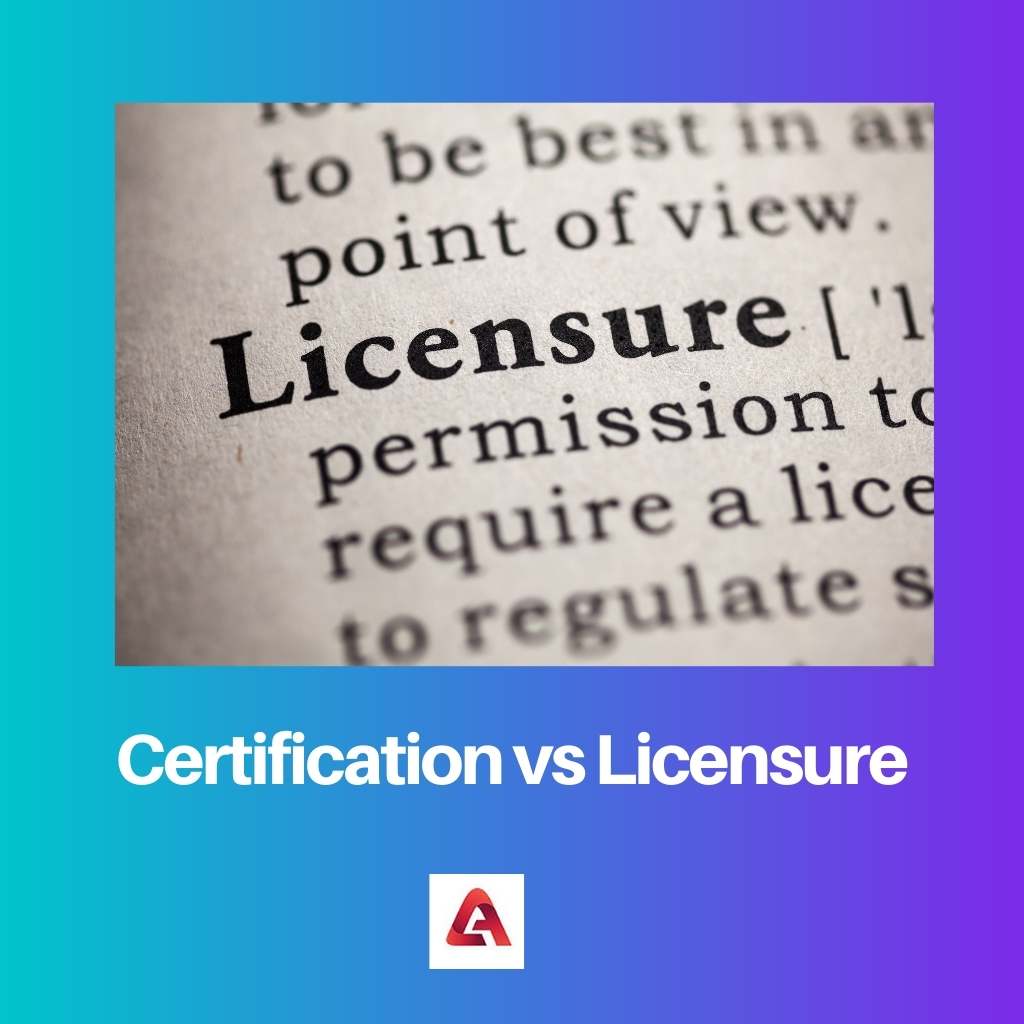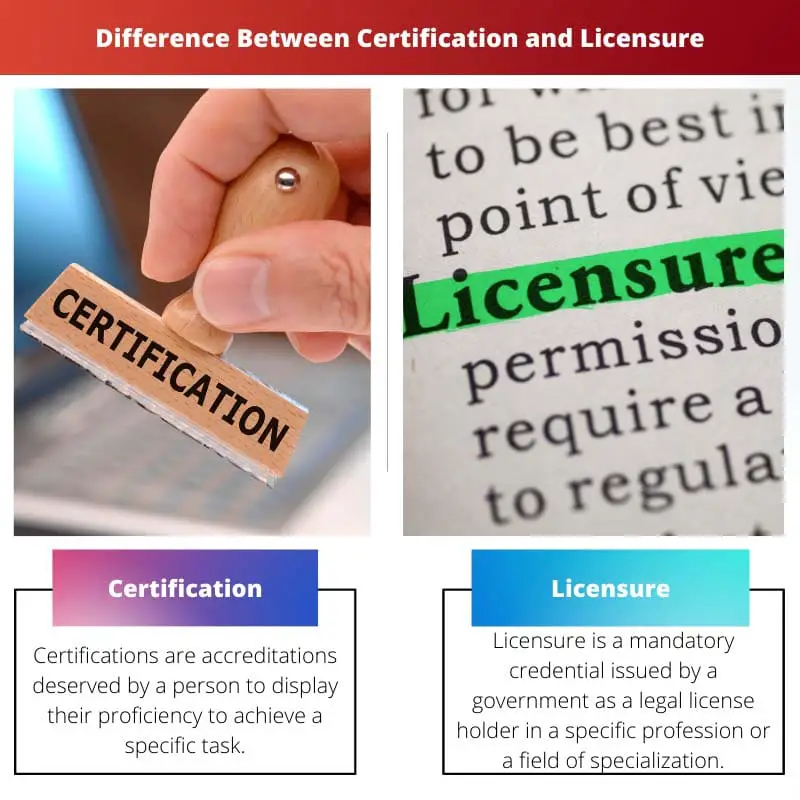In the field of examination and practice, the terms certification and licensure get misunderstood. Usually, they go hand in hand but are different terms.
Certain professions require certification and licensure. Certification is a voluntary process to enhance skills, and licensure is the qualification to be competent in a specific field.
Key Takeaways
- Certification verifies a person’s skills and knowledge, while licensure is a legal requirement to practice in a particular field.
- Certification is voluntary, while licensure is mandatory.
- Private organizations can issue certification, while government agencies grant licensure.
Certification vs Licensure
Certification is a process by which an individual demonstrates a certain level of knowledge or skill in a particular area, validated by a certificate. Licensure is the granting of a legal permit by a governmental agency to legally practice a profession.

Certification is a voluntary credential issued by a private or nongovernment organization on completing the criteria or the set standard specified in the area.
The certification demonstrates that the requirements intended are based on specific international standards. Attaining the certification is voluntary; a few examples are CPR or first aid certification.
Licensure is a mandatory credential issued by a government as a legal license holder in a specific profession or a field of specialization, for example, a Licenced Clinical Professional Counselor (LCPC).
The crucial purpose of licensure is to protect the welfare of the people, as it requires regulation and minimal competency for a professional to practice.
Comparison Table
| Parameters of Comparison | Certification | Licensure |
|---|---|---|
| Nature | It is voluntary to acquire it. | It is compulsory to acquire it. |
| Agency | It is issued by a private or non-government body. | It is always issued by an executive body. |
| Definition | It is awarded after attaining the specifications mentioned in the certificate issued. | It is a legal paper for professionals in their specific field of profession. |
| Legality | It does not affect your line of work. | Practicing without it will attract legal problems. |
| Purpose | It enhances your work with the latest knowledge. | In the case of any line of profession, licensure is needed. |
What is Certification?
Certifications are accreditations deserved by a person to display their proficiency in achieving a specific task. The certification is issued after the specified criteria, training, or education competency is accomplished.
It gets published by a nongovernment or a private organization recognized by the government.
Benefits of certification:
Obtaining certification displays a sense of dedication towards the profession and displays an effort to keep abreast with the latest knowledge.
The certification can add to the trust as it shows an endeavour to continue learning and self-improvement. The advantage of getting certification in any profession adds to the following upper hand.
- Competitive edge
- Orderliness
- Earning prospective
- Expand knowledge and skill
- Professional Credibility
Types of certification:
There are three main classifications of certifications:
- Corporate certifications are internal certifications of the company, enhancing the employees’ competitiveness. Established criteria ensure the corporates have minimum certifications.
- Product-specific or role specification certification is familiar in the marketing or IT industry as there are constant upgrades in this field.
- Professional certification is specific to any profession to enhance the benefits of the latest developments in their field.
Attaining the certificate is a voluntary process. It is not a criterion to practice one’s profession.
Losing the certificate does not affect or prevent anyone from doing the respective jobs. It is optional and does not replace the original degree. Private or non-governmental organizations issue it.

What is Licensure?
Licensure is a verification to provide service in the selected profession, and it is a legal course of action with an explicit set of conditions in the picked function.
Not having the appropriate licensure may not give the rights for the person to work. It could even attract fines or penalties.
The procedure of licensure means public safety and welfare.
Many professions require the certificate and licensure to go hand-in-hand. If you are a doctor, you need the degree and licensure to practice legally.
In the case of small businesses having appropriate licensure is compulsory. It could lead to serious trouble to operate without licensure.
The basic guidelines of the licensure are as follows:
- Obtained from a government institution or agency (federal, state, or local)
- It is legally binding for practising certain professions like law or medicine. In the field of transportation or agriculture, licensure is compulsory.
- Legal is required in the case of manufacturing or selling units like firearms or alcohol.
Benefits of Licensure:
- It is a symbol of professionalism.
- Resounding status in career.
- Authority figurine.
- Higher salary and prestige.
- Professionals can practice legally.
Licensure is certifying that a person has attained the qualification required in the specific field. Licensure can never be a non-governmental entity.
The names or titles used by the professionals have a legal impact on the licensure. Practising without licensure may attract legal or financial penalties.
Main Differences Between Certification and Licensure
- Certification is a voluntary credential that enhances the area of specialization. Licensure is a mandatory credential compulsory in the field of specialization.
- The private or nongovernment authority issue the certification. Only a government agency can issue licensure.
- Certification is a voluntary process done by an individual or company. Licensure is a mandatory process.
- A CPR Web design is an example of certification. A teacher’s degree, the doctor, is an example of licensure.
- A specific educational qualification is not compulsory for certification. Completion of the specified qualification is crucial for licensure.

- https://onlinelibrary.wiley.com/doi/abs/10.1002/j.1556-6676.1995.tb01849.x
- https://onlinelibrary.wiley.com/doi/abs/10.1111/j.1744-6570.2007.00077.x

This article was very straightforward and informative, I think it’s well explained what the differences are
I never really thought about it, but it makes sense that certification and licensure are different
This is a very informative article, I didn’t know there was a difference between certification and licensure – I thought they were the same thing
I think this should be taught in schools, that way people are aware of all their options
It was very insightful, I enjoyed reading it!